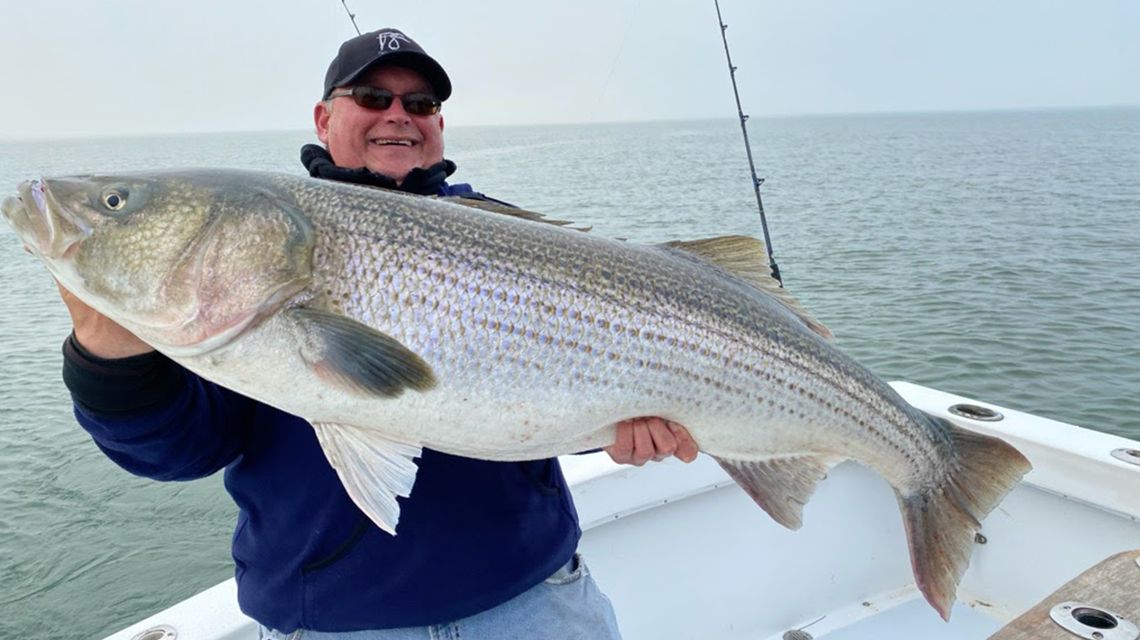
West Virginia angler Alex Foster breaks same IGFA world record twice in one month
CAPE CHARLES, Va. (BVM) — Alex Foster, an angler from St. Albans, W.Va., has been around fishing for a long time. The 51-year-old has been fishing since he was a little boy going on trips with his dad and has been fishing across the country in his downtime for decades. That being said, the fisherman has seen his fair share of big fish, but during a particularly successful trip to Cape Charles this past January, Foster knew he had something special.
“I’m fighting this fish and oh my gosh I can’t hardly do anything with her,” Foster said. “For some reason this thing has more energy than any striped bass ever caught.”.
On Jan. 7, Foster and his father set out on a fishing trip captained by Clinton Lessard of Sho-Nuf Sportfishing in Chesapeake Bay, the largest estuary in the United States between Virginia and Maryland and home to approximately 350 different species of fish. One of the most well-known inhabitants of the Bay is the striped bass, known regionally as a rockfish. Typically caught in saltwater, striped bass are easily recognizable by the seven or eight black stripes that run along the scale rows on each side of its long, silver body.
On this January day, Foster wasn’t only setting out to catch a striped bass, but to catch the biggest. Much like the fictional Captain Ahab trying to take down the monstrous Moby Dick, Foster was committed to getting a memorable catch of his own, a striped bass that would put him in the world record books.
“I’ve been watching the growth of these striped bass for years,” Foster said. “They started showing up pretty much at Chesapeake Bay. A majority of them were in the Cape Charles area, the big ones anyway.”
A moratorium on the striped bass in the area gave the angler an opportunity to fish near the Cape without as much traffic. Foster, who admitted to having gone for a number of records mostly in freshwater fishing, wanted to establish a saltwater world record with the International Game Fishing Association (IGFA) and made a number of calls to see what records he could break and found the striped bass category. After extensive researching and planning, Foster was able to get a bass for the record books on that cold January day.
According to the IGFA, Foster caught a striped bass that was measured at 122 centimeters, or just over four feet long, the longest in the all-tackle length category. With the measurement, Foster’s fish easily beat the previous record by five centimeters. The moment was a highlight for the avid fisherman.
“When we realized we did it, it was pretty sweet,” Foster said. “It was kind of the Rocky pose after releasing the fish. A lot of high fives. … It was great. The feeling was amazing.”

This does not mean that Foster broke the record for the largest fish, which weighed in at 81 pounds and 14 ounces, as this fairly new category focuses mostly on conservation of the species. Established in 2011, the all-tackle length category requires the return of the fish to the water, unharmed. As fish are not brought to land to be weighed as they typically were in the past, fish that are entered for the category are not eligible for weight categories, according to the IGFA. This was an important part of the record for Foster, as he fully supports the idea of catch and release to ensure the health of the species.
“This may be one of the best things that’s ever happened because it promotes catch and release,” Foster said. “I think that’s priceless, I really do. I think these giants should be released. I think protecting the resources is the most important thing. … I think we live in an age where it’s just take, take, take, take, take and people need to be more conscientious that this resource is not limitless.”
Foster caught the fish near buoy 38A in the Bay while trolling, a technique where one or more lines are either drawn through the water from behind a moving boat or slowly winding the line in while fishing from a static position. Foster used live eels for bait, a popular bait choice for striped bass.
Just over a week later, Foster and his dad returned to Cape Charles and Captain Lessard to fish the area one more time. This time, the group found many more boats than when Foster had broken the record with many fishermen actively trying to take the top spot from him. Although there was a crowd of people vying for the record, Lessard told Foster he had a feeling about their trip.
“I know there were a number of people out there trying to get the record since I already broke it,” Foster said. “Clinton just kept saying, ‘Alex, I’ve got a funny feeling we’re going to do it again.’… Clint was pretty sure it was going to happen.”
Near the end of the day, like clockwork, the rod went down signaling another catch. Foster grabbed the rod and knew in that moment there was a chance that Lessard was right.
“I knew at that moment this was another big girl,” Foster said.
This bass was just as big as the one he had caught earlier, if not bigger. When Foster measured the fish to the fork in the tail his suspicions were confirmed, the fish was even larger than the previous one measuring 124 centimeters.
“I started laughing. This is actually bigger,” Foster said. “Both fish, oh my gosh, couldn’t be better.”
Though the review process for the record took 45 days for the IGFA, in the end it was confirmed that Foster not only broke the record with his first catch, but upped the record with his second. The longtime fisherman had earned his first pair of world records. For Foster, the achievement was one he could share with his 82-year-old father, who was diagnosed with pancreatic cancer last year, as well as his late mother who always enjoyed seeing the big fish Foster would catch.
“The only reason I have done all this was my mother, when she was living, got such a kick out of me turning in these records and she was always prodding me to try to do this,” Foster said, “I was with my dad on both trips. How cool was that? It was so special. … My dad was like, ‘Oh my God. Alex, I am so proud of you.’”
Foster understands that he couldn’t achieve the record on his own. Without the support of his dad and the work done by Captain Lessard, Foster doesn’t even know if the record would’ve happened.
“I can’t take all the credit,” Foster said. “Clint is special with Sho-Nuf Charters. He really is a special guy to say the least. I hope he gets more business than he can handle. I just want to make sure he leaves some room for me.”
Foster’s advice to anybody who is trying to break any fishing world records is to come in prepared and know as much as you can about the fish and the area you’re going to.
“Just research, man that’s all it is,” Foster said. “You just gotta do the research, understand the species, find the right captain. … You gotta put some work in that’s for sure. It’s not going to be easy, but a world record shouldn’t be easy and I think that’s a good thing.”
With a record-breaking year many anglers would dream for in the span of two weeks, Foster has put himself at the forefront of many fishing conversations. With coverage from internationally renowned sporting magazines and news outlets, Foster has put his name on the map in the fishing world. With the increased attention has come an increased demand for IGFA catch and release products like bump boards which Foster said the organization has seen be sold at a furious pace.
“I talked to Nick (Haddad) at IGFA and he said that they have absolutely sold out of bump boards,” Foster said. “He said striped bass enthusiasts all up and down the coast it’s all they’re talking about, trying to beat this record.”
Foster, who owns an entertainment company in St. Albans, has found himself with more time to fish due to the limited number of events due to COVID-19. Although the fishing season for striped bass has ended, Foster is sure that by the time he gets back out to the area he will be chasing the record book again. If that does happen though, he is happy it is for the good of the species, though he will be gunning for the top spot again.
“I’m hoping that this winter I can give it another shot. I have a funny feeling it will be beat by then though,” Foster said. “That just makes for another challenge. I hope somebody does beat it or beats it multiple times. That’d be good. That’d promote the concept of catch and release and that’s what it’s all about, protecting the species.”
In terms of all the trips the avid fisherman has done, this ranks within the top five of Foster’s most memorable. But Foster does have a warning for other fishermen who may want to take the journey themselves.
“It was such a treat,” Foster said. “Oh my gosh. It was such an amazing experience. It’s addictive too. I’m going to warn everyone reading this, be careful you will go broke. It’s an absolute blast to do this. It’s so much fun.”
Of all the telltale fishing stories Foster could come up with, it may be the actual story that would be his most unbelievable. Two weeks, two fish, two records.







